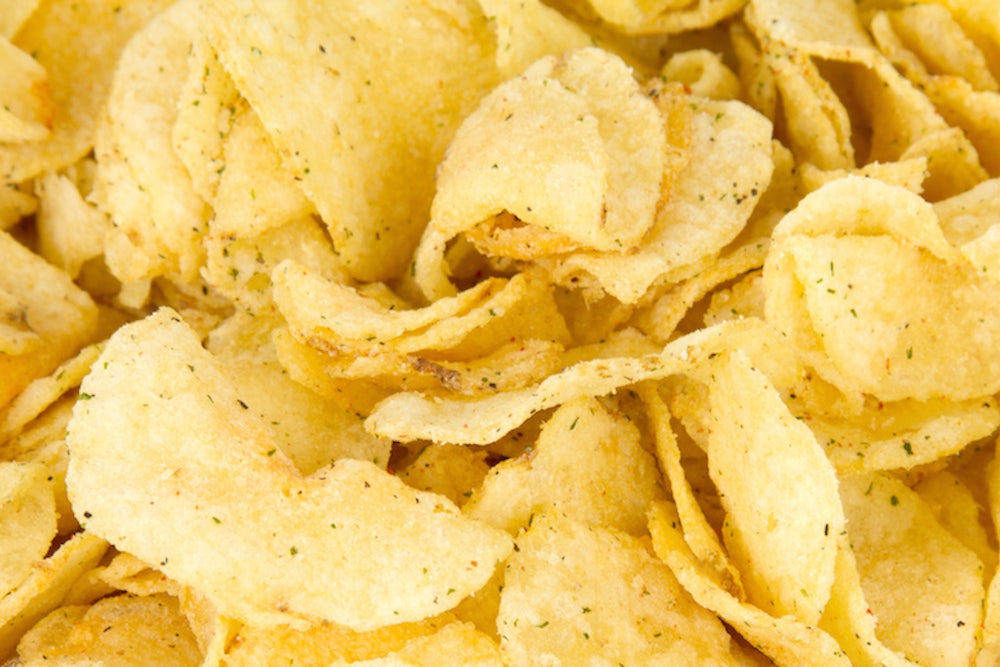If, as Nietzsche assures us, wit is the epitaph of an emotion, what then is the chip if not the apotheosis of hunger? The chip promises so much—yet delivers nothing at all. Vladimir Putin disdains the alcohol that transmogrifies his countrymen and women into slobbering, soulful wretches but I’d wager he forgoes chips as well. When I consider the amount of time I’ve wasted eating chips—let alone the money I’ve spent on these fried and friable folderols—it occurs to me that, sans crunch, I might easily have gained control of the Russian Federation and turned it into my own personal fiefdom.
With almost any snack food, no matter how grimly artificial, there is still meaningful discrimination to be made. You can look back to a better sausage roll—conceivably even a finer cheese football or Twiglet—but when it comes to the chip, “Où sont les neiges d’antan?” is not a question worth posing. The paradox is this: each and every chip leaves bag or bowl with a sort of nimbus of individuality surrounding it. “I,” it rustles to you, “am the one and only chip, the chip you’ve waited for all your life. Only I can satisfy you and I can do it because of my unique characteristics: I am the most flavorsome! I am the very epitome of crispiness itself!” And despite having been taken in a hundred thousand times or more by such salty nothings, we still bite down expecting things to be different, only for our true love, within a couple of spasms, to become subsumed to the goo constituting its predecessors.
Yes, yes, I know. You protest that you remember the bags of Smith’s or Golden Wonder that, as a child, you were handed through the back door of the pub with great affection. But that’s just it: note the plural. These were bags that you enjoyed, probably bags and bags and bags; for, even more than chewing gum, the chip is the food that brings us closest to the ruminants and you wouldn’t expect a cow to discourse too meaningfully on the greatest mouthful of grass she ever chewed. I, too, enjoyed those bags of chips but I recognise now that these were only the flimsy gateways I shouldered my way through into a lifetime of addiction.
Yes, addiction. I don’t use the word lightly in its traditional sense—we’re not addicted to chips in the way a minor cleric in the Church of England might be addicted to reading the novels of Anthony Trollope. I’m talking about full-blown, vein-clogging, pavement-scouring, down-and-outing pathological addiction—the kind usually associated with crack cocaine or the novels of George R. R. Martin. The only reason we don’t acknowledge our addiction to chips to be such is that we have ordered things so our supply can never be interrupted and warped our social conventions so their use (note I don’t say “consumption”) is almost always acceptable. Even in circumstances where to munch would be completely beyond the pale—for example, listening to András Schiff play the Goldberg Variations at Wigmore Hall—you’re still allowed (nay, encouraged) to rush out in the interval and crunch up a storm.
And bite down on this: chips are incredibly unhealthy. Full of salt and sugar and seemingly designed to inflict dental caries, since the spatula-like forms they assume during their pitifully short half-lives thrust all that salt and sugar up between root and gum. Don’t take my word for it. Ask any cardiologist or dentist: chips are the enemy. But if everything I’ve said so far isn’t enough to convince you, then here’s the clencher: the artisan chip. Just as evil drug barons employ chemists to synthesise new and more addictive narcotics to enslave our vulnerable youth, so small potato growers in Shropshire band together, sousing chips in cider vinegar and sprinkling them with rosemary in order to do the same to our feckless bourgeoisie.
Is there anything—and I mean anything—more useless and destructive than an artisan chip? At least your common-or-garden chip is, no matter how pernicious, an established feature in our culinary landscape. But the artisan variety? Cardamom and fenugreek, garlic and chilli, black pepper and sea salt: these are just some of the grotesque additives these “artisans” coat their death discs with! It almost makes me yearn for the landlocked prawn cocktail flavourings of yore.
Then there are crinkle-cut and skin-on chips, thick-cut and Kettle—all of which exhibit the same homicidal inclinations, stabbing at cheek and tongue with their tooth-tooled daggers. Last summer, my son and I walked almost the length of England and nearly every pub we came to was serving up some new take on this beastliness. After about a week of it, his poor little mouth almost cut to ribbons by these “snacks,” he was begging me for relief. “No more artisan chips, Dad,” he moaned. “Please.”
But, poor child, he was ignorant of the psychological horror of chip addiction, of how it takes only a few minutes for the memory of both chip hit and devilish chip comedown to be washed away by God-given saliva. Come the next pub, he would be clamouring for more of the wretched things. I identify: I mean, I am writing an entire column on the subject but once I’ve finished I’m heading straight to the corner shop. I’m feeling a little peckish and there’s a bag of chips there with my name written on it.
This piece originally appeared on newstatesman.com.
Image via Shutterstock.
